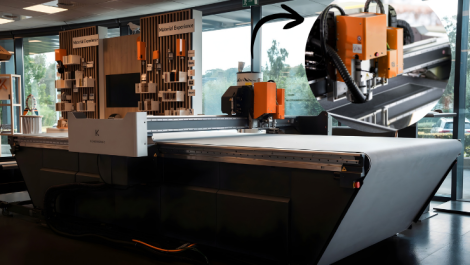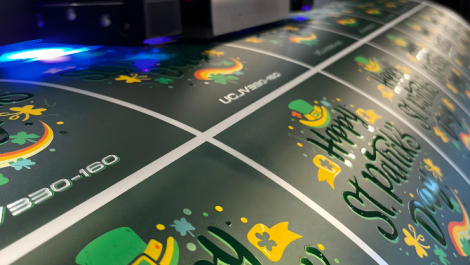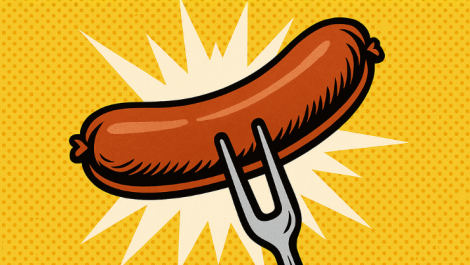A versatile entry-level machine, the Hollanders ColorBooster 250 can be configured to suit the production requirements of the end user.
Customers of Hollanders are able to benefit from a total solution including machines, software and supplies, that provides a sound path into digital textile printing.
The concept of printing digitally to textile is not new, with scores of machines available that have been converted to accept dye sublimation ink for direct and transfer printing. Businesses entering into this type of production, however, are now faced with a greater choice if they want to generate fast and reliable throughput which requires a dedicated printer that has been developed specifically for working with fabrics.
Perhaps the most cogent difference between Hollanders and the majority of alternative manufacturers is that this Eindhoven based company has always specialised only in digital textile production.
Additionally, not only does it develop and make machines for printing, it also supplies a turnkey system which incorporates all the elements required for businesses to work with polyesterbased materials that can be used successfully for a broad range of applications.
The advantages of digitally printed textiles are many and varied but the need for more environmentally- friendly and sustainable output is now becoming a pre-requisite among many print buyers.
As a result, the trend for producing soft signs, banners, flags and a whole host of indoor and outdoor applications is seeing steadily increasing demand for the right technology and best machines. Hollanders is no newcomer to the textile market, with its original machines that were manufactured a decade ago still in use throughout Europe today.
This longevity is testimony to the skills of Peter Hollanders who has had the foresight to predict market requirements for digital solutions, and design and produce them in accordance with present day and future trends.
The principle behind Hollanders is that companies are able to benefit from a total concept which includes machines, software and supplies with the choice of either a stand-alone solution or an integrated workflow configuration that accommodates all textile production requirements.
Lower levels of operator intervention lead to higher reliability and a subsequent reduction in waste which, combined with the printers’ use of less water and lower amounts of energy, result in a very positive ROI showing an attractive total cost of ownership and a low square metre price.
The company’s original ColorBooster 230 2.3 metre system was complemented subsequently by the ColorBooster XL production printer that has proved itself a work-horse for print companies who want to reap the benefits of printing direct to textile using high energy disperse inks without sacrificing either durability or quality. The technology used by Hollanders provides bright colours and a wide gamut, generating a consistently accurate and reliable workflow with excellent ink density and UV stability.
In recent years the 3.2 metre Hollanders Color- Booster XL has given the digital textile printing market a tough, ergonomic machine that is designed to work with a comprehensive selection of polyester based fabrics. Constructed to be used with either low energy dye-sublimation ink or with high energy direct disperse ink, this printer’s clever design complements its superior production capabilities. It is upgradable so that different colours, additional heads and the capacity for higher speeds can be addressed.
User demand led to the company developing the first double-sided printer which incorporates two print engines and an integrated fixation unit. The ColorBooster DS-320S now meets 24/7 industrial levels of textile printing with its ability to print either the same or a completely different image simultaneously onto both sides of the material. This machine, which is also available in a 2.1 metre version, features on-board climate control, Hollanders own media transport system for precision feed and handling of the fabric, and a remote support system.
Researching market requirements has now led Hollanders to develop and manufacture an entrylevel textile printer which, again, follows the modular principle in that it can be upgraded as and when end-user demand changes. Called the ColorBooster 250 it is modestly priced yet features many of the elements which have led to the ongoing high quality production and reliability which are both essential parts of the company’s other systems.
The intention with the ColorBooster 250 is to bring the benefits of digital textile printing to a wider audience, with its popular width of 2.5 metre and a very realistic investment cost. It includes many of the established elements which are well proven in other Hollanders equipment, and is suitable for interior applications when used with low-energy dye sublimation inks or as a multi-functional system ideal for indoor and outdoor wide format graphics with its high-energy direct disperse dyes.
Despite its moderate investment cost, the ColorBooster 250 is ergonomically designed with a rugged yet sleek construction incorporating a sophisticated system to guarantee high quality production on a broad selection of polyester textile materials. Available in three versions, this machine can be configured to suit the production requirements of the end user, with upgrade paths from the Starter and Productivity Editions to the Ultimate Edition.
The Hollanders approach to efficient workflow and optimum throughput is complemented with its ColorFix and ColorWash units. The ColorFix is, at its name suggests, a fixation machine that uses middle-wave infra-red energy, enabling constant temperatures across the surface of the material so that colours are fixed to result in UV-resistance, brilliance and durability. A roll-to-roll device which uses the same media core as in the other production units from Hollanders, the ColorFix fits seamlessly into the overall production workflow and can be operated by one person.
The Hollanders ColorWash has recently been upgraded and is an industrial strength modular unit that incorporates washing, drying and ironing in a fully automated process. Its on-board processor system controls the water temperature, the washing speed, the concentration of soap, media tension, drying and ironing making it a fully integrated unit for finishing digital textile prints. In its latest version, production rates are increased as the innovative new suction method generates faster drying by vacuuming the water out of the media.
For users wanting to move into digital textile printing for the first time, or who are upgrading existing machines for more productive output options, the systems available from Hollanders provide tough, reliable and accurate work-horse machines. Unlike most other manufacturers in this sector, the company has concentrated solely within this sector and understands fully the requirements and expectations of end users who want to generate soft signs, flags, banners, interior and exterior displays, plus the growing range of roll-fed applications where this technology offers a cost-effective and sustainable alternative to alternative printing processes.





